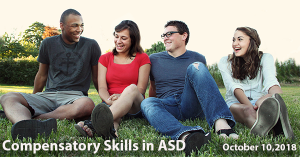Check out other stories from the Latest News
Teens with ASD “Compensate” for Better Social Skills
By Chelsea Toledo, M.A. on October 10, 2018

Background: Autism Spectrum Disorder (ASD) is characterized by differences in communication and social behavior. Research has suggested that people with ASD experience deficits in theory of mind – the ability to attribute emotions, beliefs, intents, desires and other mental states to themselves and to others – and that these deficits underlie the social differences perceived among people with ASD. However, people with ASD vary widely in their social abilities. Are there any factor(s) that compensate for impairments in social skills?
What’s New: A recent study set out to determine patterns explaining why some young people with ASD seem to have better social skills than others. In total, 136 participants with ASD between the ages of 10 and 15 – chosen from those already enrolled in the Social Relationships Study in the UK – participated in the study, which involved a series of tasks and questionnaires.
The researchers identified two major groups of interest in this study:
- Low compensators, who had low scores on both the Autism Diagnostic Observation Schedule (ADOS) and the Theory of Mind assessment.
- High compensators, who had high scores on the ADOS in spite of low scores on the Theory of Mind assessment.
High compensators had higher IQ and better executive functioning (i.e., self-control), as compared to low compensators. High compensators also had higher levels of anxiety than their low compensating peers.
Why it’s important: This article suggests that – contrary to popular belief – people with good social skills don’t have a milder form of ASD. Rather, they are compensating with their other strengths. The impacts of this compensation, including anxiety, merit further study.
Help me understand :
| Source(s) : |
| Tweet |

